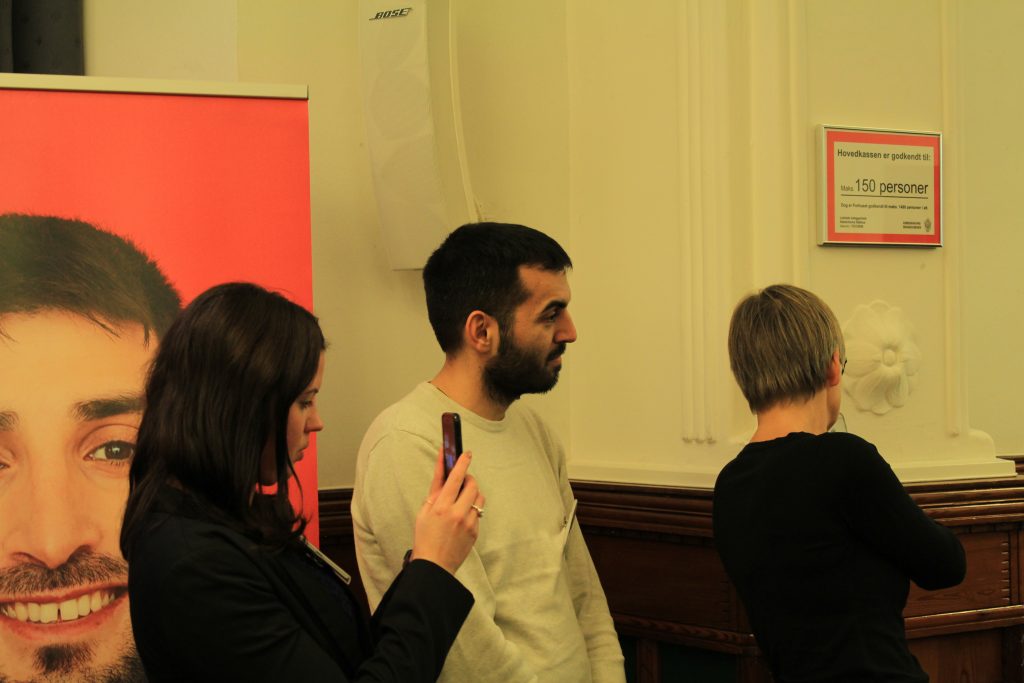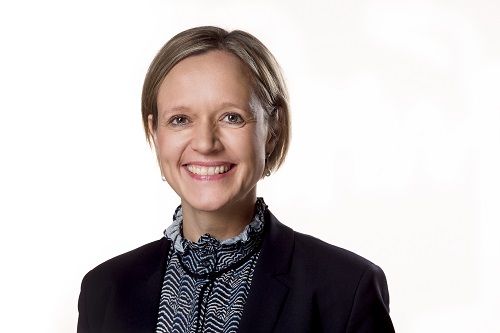Quite a few people had already gathered by the time I arrived at Copenhagen City Hall.
I asked Dorthe, a municipality employee, if the mayor’s assistant was nearby – I was supposed to meet her first so she could take me to Cecilia Lonning-Skovgard, the employment and integration mayor.
“She isn’t here yet” Dorthe told me. Then, the woman standing between us turned to me, laughed, and said: “You can also ask me, in Danish, you know”. She’s from America, and I heard her speak English in the hallway before.
“Oh, okay, I didn’t know you speak Danish… but yeah, I know, I’m also pissed off when Danes assume I can’t speak the language,” I replied.
Though I’m truly only pissed off when they switch to English after I already started the conversation in Danish, making it absolutely clear that, though I have an accent, I speak the language.
Expats galore
I went further into the room – it was filled with graduates of a course that aims to retain bright expats in Denmark. They are relatively new to the country and the experience of being a foreigner here.
But they are smart and they possess skills that Danish companies want. This is why Lonning-Skovgaard supports the Greater Copenhagen Career Program (GCCP), which aims to equip students (and recent graduates) with knowledge necessary to find and fill jobs in the Danish labour market.
I asked her about the program, the difficulties faced by internationals in Copenhagen and about government initiatives that seem to counter efforts like GCCP.

GCCP:
The six-month program helps students (and recent graduates) with CVs, LinkedIn profiles, networking and navigating the Danish job portals.
It also offers job matchmaking activities with companies, a personal mentor, and lessons on the work culture and workers’ rights in Denmark.
Among the companies it interacts with are Novo Nordisk and Ørsted.
Cecilia Lonning-Skovgaard:
A Venstre politician, she’s the Mayor of Employment and Integration in Copenhagen. Formerly an employee of the HR department of Ørsted, she holds a master’s degree from both Aarhus University and Harvard
What do you hope Denmark will gain from this initiative?
Danish companies are facing a skill shortage and that’s especially true for companies in the Copenhagen region. Every day we hear stories about companies failing to fill positions. We really hope to be able to provide some of the educated workforce which is currently in short supply and high demand.
For Denmark at large, ensuring that companies have access to the right skills means that they’ll be able to sustain society as we know it today, thus providing for the welfare that all Danes recognise and appreciate.
We’ve seen with a number of startups that they grow to a certain size and they find that they cannot find the talent required and they move to the US. That’s really just a tragic waste.
What are some of the difficulties people face coming here – are these addressed in the program?
In terms of entering the job market, I think you can point to three challenges: the fact that networking accounts for a huge proportion of recruitment. So many jobs are not being advertised, and even if they’re advertised they’re still being filled with people who know someone who know someone.
Another one is understanding and taking part in Danish work culture – what’s the importance of the Friday breakfast meeting, what is a Christmas lunch, why is it important to do the DHL relay, and so on and so forth.
Thirdly, for the large companies who see themselves as global companies, English is absolutely fine as the language you work with, but if you move three steps down the ladder to the medium-sized companies, they will, to a large extent, rely on Danish as their working language. For some it is a barrier that a potential employee only speaks English – so how can you mount that barrier? How do you navigate around that obstacle? Obviously the program encourages students to work on their Danish skills, but we also addressed this issue: what to do if you knock on the door of a small or medium-sized Danish enterprise, you only speak English and you have to convey your commitment towards making it work after all.
There’s also the emotional side of the deal: the fact that Danes are sort of caught up in their own lives, have their own circle of friends and are not necessarily very open towards new friendships. Danes pretty much go to work, go home and work a bit in the evening – they don’t work until 6-7 o’clock and go to the bar afterwards. In that sense, meeting Danes and getting to know them properly is a challenge that one could encounter.
What is your view on expats (refugees exempt) now being required to pay for Danish language courses?
I think it is an obstacle for what we’re trying to achieve. I think it makes sense to ask professional expats to pay for their Danish education. But I’m in dialogue with my party’s members at Christiansborg about this, as it seems like we forgot the body of international students who don’t have the same means to pay for this education and for whom it can be a crucial factor in getting a job in Denmark to have an adequate knowledge of Danish. It’s expensive. But for now, no progress is being made. It’s something that we will try to push forward and see if there could be some room for negotiation.
What do you think people take away from this course?
An understanding of the value of networks, as well as some practical tools. What do you do? You set up a LinkedIn account and you try to invite the people you know. How do you work to get a foot in the door of Danish companies – perhaps apply for a part time job, working two to three days a week, a couple of hours every afternoon. You can use your MA thesis to connect with a company, do fieldwork for them, and so on. Getting out there, expanding your network, getting references. These would be some of the key takeaways.
Is enough being done to attract internationals and make them feel welcome while they’re here?
I think a lot of things are done but you have obstacles coming from two different sides of the political spectrum. From the far right, you have various regulations being passed with a high degree of symbolic value, which send a signal that Denmark isn’t really open to foreigners. On the left, very much fuelled by the labour associations, you have requirements such as the ‘beløbsgrænse’ – the minimum monthly salary one has to earn to be allowed to stay in Denmark – which is set up too high [426,985 kroner].
Not long ago, the government cut seats allocated to international students on English language courses. What’s your take on this?
This works against our goals as well. It’s all a matter of striking the right balance. We did, to some extent, see a pattern where a lot of the really bright students who completed degrees that companies very much need – within engineering, economics, finance and so on – left immediately.
I think that more programs like GCCP would be great. And, rather than just cutting the number of seats, they could have looked even further at where the skill shortages are right now and cut according to that.
Are these programs enough to counter the trend that many expats don’t feel welcome in Denmark?
It’s tricky. I spent 15 years in HR before becoming a mayor, and expats very seldom told me they didn’t feel welcome. They always raved about how great the international schools are: we have the European school, we have kindergartens offering English communication all day and so on. In general, they liked Copenhagen, they liked being here, their kids liked it, they could bike here and they felt safe in the city. I never really heard them not feeling welcome. I think there’s a group of professionals who, I would claim, definitely feel welcome here.
And then there is a different group. Maybe the ones who experience this hidden resentment towards certain groups in society: people with non-ethnic backgrounds. This makes them feel unwelcome. Obviously there was a huge debate back in 2015 when we had the influx of Syrian refugees, but even that was turned down later on – very much so. You can definitely have a discussion about the tone of voice within Danish society and its political debate, asking how tough our immigration policy should be. But does your average American engineer, who has worked for Ørsted for three years, really feel hit by that? I don’t think so.
In your opinion, is it difficult to bring and keep qualified people here?
The fact that a large part of the process is digitised and that a lot of the paperwork is now in English, and so on, definitely makes things easier. But yes, if you go out to any big Danish company and talk to their HR and mobility department, they would say: “Yes, it’s still cumbersome – especially if you’re talking about getting expats outside the EU or expats with spouses from third world countries.” Some of the things companies would like to change are: more flexible regulation of expat taxation, easier administration of expat pension schemes, and English-language options for all content at borger.dk and skat.dk.
Donald Goff Molina III:
Puerto Rican expat with five years of professional experience in the US and a master’s in business administration from CBS
What did you gain from the Greater Copenhagen Career Program?
Tangible tools that I could put to use quickly and with which I could fail quickly and troubleshoot, instead of accumulating a vast amount of tools without testing them out – as they do in some other programs.
My mentor was an HR person, Jens. This was very helpful: the fact that I had somebody who understands what Danish companies look for and how they evaluate cover letters and CVs. This puts me in a great position to meet those expectations.
One aspect that he highlighted is providing an additional dimension that you can market. My level of energy, for example, is hard to convey on paper. He told me that if there is a means for you to engage outside of a cover letter, then definitely pursue that.
All of this has helped me to apply for positions and getthrough to the next round.
What did you learn about job seeking in Denmark and Danish work culture?
Danish companies are really into your skills and your capabilities, but they’re more into what the fit is: how you connect with the rest of the team and the synergies that creates when you are plopped into the team, like a piece of Lego that connects to the structure if it’s the right piece and contributes to the overall whole.
There are a lot of valid tools they use to assess the individual. You have personality tests like the Garuda test or the Whole Brain model. They frame you in terms of your preferences. My Whole Brain model goes more to the blue zone, which means rational, number-driven, quantifiable, so if you were to address me I would need to have that information validated and backed up by numbers or some solid evidence to sustain your argument. But these tests are complemented by a discussion. Which is good because I also like to keep things informal and colloquial and this is a disjunctive regarding my Whole Brain model.
Jens suggested that, on many occasions, you need to downplay your CV.
therwise you’ll give the impression that you are not humble, that you’re a bit cocky, and that you’re overqualified. Whereas in the US and Latin American professional environments, you always want to highlight you’re the best and that you have a lot of competencies.
Can you imagine settling here?
Yes. The fact that you don’t have to worry much about things like education or healthcare allows you to focus on other things. But three years ago I would have said no – there is a high level of complacency that comes with the Danish system.
People have it relatively easy.
Do you feel welcome in Denmark?
My answer is more inclined towards no. For me, welcoming means high levels of interaction, like “I care for you!” My frame of reference for being welcomed is a sense of community, and there’s really not a community here that I can relate to.
One of the trade-offs of having a very individualistic and autonomous society is that you become individualistic and autonomous. Where I’m from, everybody talks to everybody – you say hi and good morning in the supermarket. Here, you’re odd if you try to interact with people. It feels a bit distant and cold. Yet when you engage people and take that step, that unconventional step, people will take it positively.
Were there any downsides of the program?
The amount of one-on-one coaching we got was not a certainty and more based on an agreement between my mentor and myself – that he could commit that time. But it wasn’t a given. If suddenly your mentor had a kid or they had to travel and could not be there, you didn’t get as much attention.
Margarita Genova:
Bulgarian master’s student at DTU with a BA in software development
How did the Greater Copenhagen Career Program work out for you?
I didn’t choose my mentor, but I really liked that they matched me with someone international: a Japanese man named Naoya Segawa. He also participated in this program – in 2016, I think. So he knows how things work. I could message him and he would answer me straightaway. Before the interview for my current job, I called him on Skype and we went through questions they might ask.
He told me to be confident in what I’m saying because they can feel if you’re nervous and might think, for example, that I’m not being entirely truthful. My mentor also suggested I should use bullet points in my CV and only elaborate on the details if they ask during the interview.
I learned how to express myself more clearly and how to intrigue people without telling them the whole story so they’ll invite me in for more. I also learned about job portals – since I’m studying at DTU, I only knew DTU Job Bank before the program. I now also know about different graduate programs that companies offer students who just finished their master’s degree.
After rewriting my CV two times during GCCP, I got invited to several different interviews and eventually got my current job as a front-end user experience designer at the startup Monsenso, which provides mobile solutions for mental health patients.
What are some cultural difference you could highlight between Bulgaria and Denmark?
People here are happy if you tell them you don’t like something in the way they do things, and they will take it as constructive criticism that they can use to improve themselves. You don’t have to worry what they’ll think about you as a consequence.
But the weirdest thing for me here was keeping it unofficial in, like, everything. For example, in my country, when you write an email, you have to use formal words such as ‘dear’, ‘please’ and ‘would you’. Here, students don’t even call their professor by their last name. That was really weird for me at the beginning, but now I think it’s actually cool. You feel like the person you’re talking to is a friend and, as a result, you feel more comfortable asking them about anything, and they’ll be like, “Yes, sure, I’ll help you, I’ll tell you more about the subject.”
Do you feel welcome here?
Sometimes I don’t. It differs from Dane to Dane. I feel more welcome by Danes who have lived abroad and have some international connections and thus are already open to foreigners.
But overall I do. When I first came here and had to go through the initial processes of getting a CPR and opening a bank account, everybody was really helpful. They talked in English and they didn’t look down on me because I wasn’t able to speak Danish. “Jeg kan snakke dansk nu, men jeg er nervøs fordi udtalelsen er svær.” I’ve been learning it for a little over a year.
You speak pretty well!
Thank you – it’s just that the pronunciation is difficult. But I understand what people are saying for the most part.


















